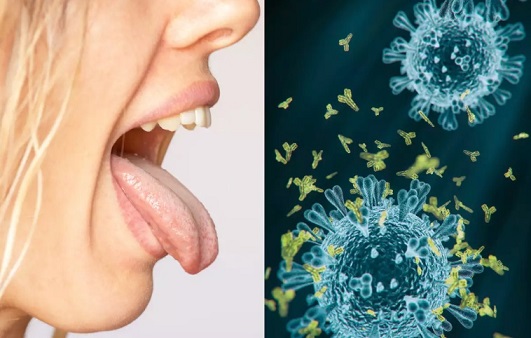Nikhil Prasad Fact checked by:Thailand Medical News Team Feb 18, 2025 1 month, 3 weeks, 2 days, 7 hours, 20 minutes ago
Medical News: The COVID-19 pandemic has affected people worldwide in many ways beyond its well-known respiratory complications. New research has highlighted a troubling connection between the virus and various oral health issues. A comprehensive study conducted by researchers from the University of Naples Federico II, Italy, and Sechenov University, Russia, has examined the impact of COVID-19 on oral health, particularly focusing on oral lesions, taste disturbances (dysgeusia), and osteonecrosis (bone death in the jaw). This
Medical News report explores the key findings and their implications for public health.
 The Growing Concern of COVID-19 and Oral Health
Understanding the Link Between COVID-19 and Oral Manifestations
The Growing Concern of COVID-19 and Oral Health
Understanding the Link Between COVID-19 and Oral Manifestations
Scientists have long suspected that COVID-19 could have a direct impact on oral health, primarily because the virus enters the body through the ACE2 receptors, which are found in high concentrations in the mouth, tongue, and salivary glands. The latest study confirms that oral health complications are common among COVID-19 patients, particularly those with severe cases or those who have underlying health conditions like diabetes.
Taste disturbances, commonly referred to as dysgeusia, have been one of the most widely reported oral symptoms of COVID-19. The study revealed that up to 59% of infected individuals experienced some form of taste dysfunction. This includes a complete loss of taste (ageusia), reduced taste sensitivity (hypogeusia), or an altered taste perception (parageusia). These symptoms were particularly persistent in some patients, lasting for weeks or even months after recovery.
Oral mucosal lesions were also commonly observed, with ulcers, candidiasis, and herpes simplex infections affecting a significant percentage of COVID-19 patients. The study found that oral ulcers were present in 16.5% to 42.7% of patients, often appearing on the tongue, lips, and inner cheeks. Additionally, patients with severe cases of COVID-19 were more likely to experience necrotic ulcers, which can lead to severe discomfort and difficulty eating or speaking. The researchers suggested that these lesions may result from the immune system's excessive inflammatory response, medication side effects, or direct viral damage to the oral tissues.
Osteonecrosis A Severe Complication Linked to COVID-19
One of the more alarming findings of the study was the connection between COVID-19 and osteonecrosis of the jaw. Osteonecrosis, which refers to the death of bone tissue due to reduced blood supply, was observed in a significant number of patients who had recovered from COVID-19. The study highlighted that patients with mucormycosis, a fungal infection commonly associated with post-COVID complications, were particularly vulnerable to developing maxillary osteonecrosis.
The study found that 76 patients with COVID-19-associated mucormycosis developed osteonecrosis, particularly affecting the upper jaw (maxilla). In many cases, patients experienced severe symptoms such as tooth mobility, halitosis (bad breath), and the exposure of necrotic bone in the mouth. The condition was
often accompanied by maxillary sinus involvement, affecting up to 30% of cases unilaterally and 15% bilaterally. Researchers noted that the prolonged use of corticosteroids during COVID-19 treatment, combined with immune system suppression, could significantly increase the risk of osteonecrosis.
Why Are These Oral Complications Happening
The research team proposed several explanations for why COVID-19 leads to these oral health complications. First, the virus's ability to bind to ACE2 receptors in the mouth may allow it to directly damage oral tissues, leading to inflammation, ulcers, and taste disturbances. Second, the immune system's response to COVID-19 can create an inflammatory environment in the body, increasing the likelihood of oral mucosal damage.
Another contributing factor is medication use. Corticosteroids, commonly used to manage severe COVID-19 symptoms, can weaken the body's ability to fight infections and impair bone health. This could explain why many patients with COVID-19, especially those who received steroid treatment, developed osteonecrosis. Additionally, stress and changes in oral hygiene during illness may have played a role in worsening oral health conditions.
Prevention and Early Detection Are Key
Given these findings, healthcare professionals are encouraged to pay close attention to the oral health of COVID-19 patients, especially those who report persistent taste disturbances, oral ulcers, or symptoms of osteonecrosis. Early detection and treatment can help prevent complications from worsening. The researchers emphasized the need for regular oral health assessments in post-COVID patients, particularly those who were hospitalized or treated with steroids.
For the general public, maintaining good oral hygiene, staying hydrated, and seeking dental care when symptoms arise can help reduce the risk of developing severe oral complications. Those recovering from COVID-19 should also be aware of the potential for long-term oral symptoms and consult a dentist or healthcare provider if they experience persistent issues.
Conclusions
The study sheds light on the significant impact of COVID-19 on oral health, revealing that the virus is associated with a high prevalence of dysgeusia, oral lesions, and osteonecrosis. The findings suggest that COVID-19 does not merely affect the respiratory system but also has far-reaching consequences on other areas of the body, including the oral cavity. The role of the ACE2 receptor, immune dysregulation, and medication effects all contribute to these complications.
The study highlights the need for increased awareness among both healthcare professionals and the general public about the potential oral health implications of COVID-19. Regular dental check-ups and early interventions could help mitigate some of the long-term consequences of these complications. As the world continues to recover from the pandemic, further research will be essential in understanding how best to prevent and treat these oral manifestations.
The study findings were published in the peer-reviewed Journal of Clinical Medicine
https://www.mdpi.com/2077-0383/14/4/1267
For the latest COVID-19 News, keep on logging to Thailand
Medical News.
Read Also:
https://www.thailandmedical.news/news/u-s-nih-study-finds-that-sars-cov-2-infection-of-the-salivary-glands-causes-weakening-of-antifungal-defenses
https://www.thailandmedical.news/news/covid-19-can-trigger-aphthous-like-lesions
https://www.thailandmedical.news/news/sars-cov-2-is-able-to-directly-infect-and-damage-tongue-tissues
https://www.thailandmedical.news/news/sars-cov-2-also-targets-the-submandibular-glands-causing-hyposalivation-and-xerostomia
https://www.thailandmedical.news/news/various-entry-receptors-for-coronaviruses-including-sars-cov-2-discovered-in-the-oral-cavity-which-exhibits-high-susceptibility-for-infections
https://www.thailandmedical.news/pages/thailand_doctors_listings
